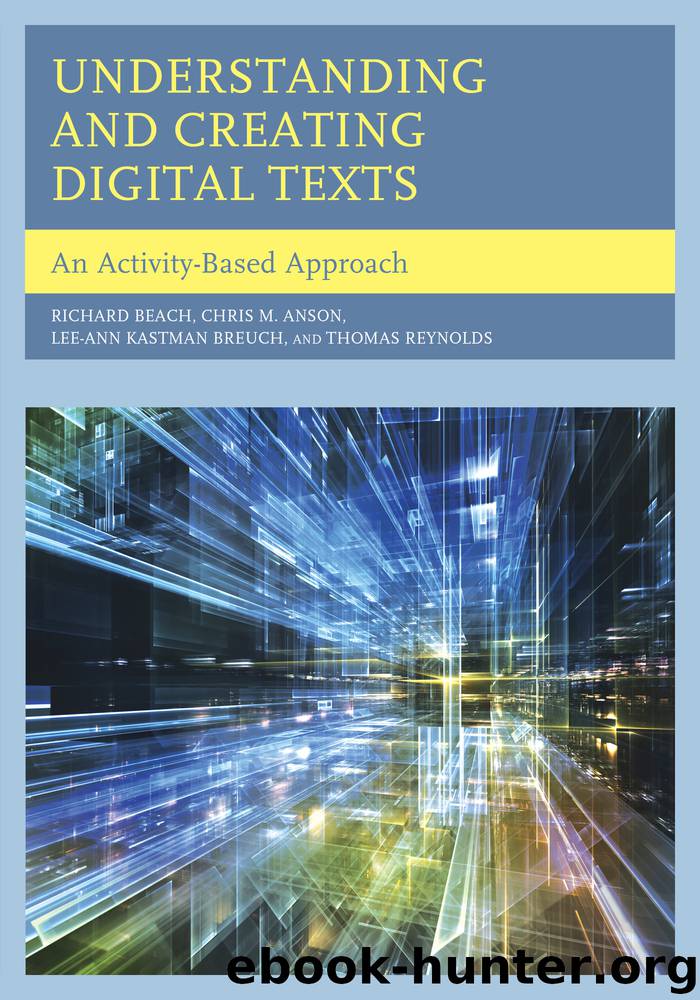Understanding and Creating Digital Texts by Anson Chris M. Beach Richard Breuch Lee-Ann Kastman Reynolds Thomas

Author:Anson, Chris M., Beach, Richard, Breuch, Lee-Ann Kastman, Reynolds, Thomas
Language: eng
Format: epub
Tags: undefined
Publisher: Rowman & Littlefield Publishers
Published: 2012-04-25T04:00:00+00:00
Wikis
Students can also employ wikis to engage in collaborative writing. Wikis are websites that allow different users to add or edit content to the same site, so they serve to mediate collaboration. While the focus of blogs is on voicing opinions, the focus of wikis is on collaboratively creating shared repositories of information (for more on resources for using wikis on the website http://tinyurl.com/lzb7d42).
Wikis foster collaboration by serving to centralize work on a single site, providing a record of users’ revisions, including links among pages within a wiki, integrating complex sharing of ideas, creating a historical record of work over time, fostering transparency for participants to view one another’s contributions, and supporting networking of ideas (Barondeau, 2014).
Students can therefore add new information to course wikis across different classes—for example, creating study guides for a course to assist new students beginning the course. Students in first-year composition classes at St. Cloud State University add new information to a wiki textbook, Rhetoric & Composition http://en.wikibooks.org/wiki/Rhetoric_and_Composition, about different aspects of learning to write.
You can use a number of wiki platforms, such as Wikispaces (for a tutorial on use of Wikispaces: http://awikispacetutorial.wikispaces.com), PBworks http://pbworks.com (for a tutorial on use of PBworks: http://tinyurl.com/l89uuxz), and MediaWiki. There are also a number of iOS and Android apps for creating wikis, apps that students can sync across different devices so that they can collaborate using different devices—for example, moving their notes taken on a smartphone to a desktop or tablet.
In using these wiki platforms, students select the edit mode to revise text. To edit a page, students should have to sign in with an account and password to avoid persons outside of class making edits to a class wiki. As with blogs and websites, students can insert links and images. Once they have completed their revisions, they then select “Save” to read their revised texts.
Because wikis include a revisions history for a document, you can determine which students in a group made what revisions, data that you can use to assess students’ collaboration based on which students are contributing what material. You can use this revision history feature to demonstrate the value of revision by showing students how subsequent revisions improved a text. With his social studies middle school students, Clarence Fisher (2007) shows students different versions of the same text on a class projector and has them discuss how and why their revisions improved their writing. He subscribes his wiki to his Bloglines [discontinued tool] so that he can receive notices of revisions; he then gives students credit for making certain revisions in texts. Fisher finds that
some kids are not fact checkers and spelling editors. These kids are more often contributing pieces of new information about a topic to a page. Other kids are adding little that is new, but are carefully following through the pages, checking the spelling on them, editing for grammatical errors, etc. (p. 2)
Download
This site does not store any files on its server. We only index and link to content provided by other sites. Please contact the content providers to delete copyright contents if any and email us, we'll remove relevant links or contents immediately.
The Art of Coaching Workbook by Elena Aguilar(51177)
Trainspotting by Irvine Welsh(21647)
The Secret History by Donna Tartt(19066)
Twilight of the Idols With the Antichrist and Ecce Homo by Friedrich Nietzsche(18627)
All the Missing Girls by Megan Miranda(15971)
Cat's cradle by Kurt Vonnegut(15343)
Ready Player One by Cline Ernest(14652)
Talking to Strangers by Malcolm Gladwell(13355)
Fangirl by Rainbow Rowell(9232)
The remains of the day by Kazuo Ishiguro(8983)
The Compound Effect by Darren Hardy(8952)
Thirteen Reasons Why by Jay Asher(8897)
Tools of Titans by Timothy Ferriss(8372)
Periodization Training for Sports by Tudor Bompa(8261)
Wonder by R. J. Palacio(8103)
The Lover by Duras Marguerite(7897)
A Court of Wings and Ruin by Sarah J. Maas(7822)
Change Your Questions, Change Your Life by Marilee Adams(7767)
The Complete Stick Figure Physics Tutorials by Allen Sarah(7368)
